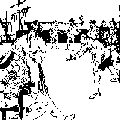17. The Great Armada
"When that great fleet Invincible against her bore in vain The richest spoils of Mexico, the stoutest hearts of Spain." —MACAULAY.
The romantic daring of Drake's voyage and the vastness of his spoil roused great enthusiasm in England. But the honours heaped upon him by Elizabeth were looked on by Philip of Spain with fierce anger. She had accepted his stolen treasure, and plans with regard to the conquest of England now began to take shape. The dockyards of Spain became busy centres, and the first ships of that great Armada, or armed force, destined for war with England, began to collect in the Tagus. If England were conquered, the empire of Spain would be safe, so thought Philip, whose possessions even now rivaled the Roman empire of old.
That a great fleet was building in Spain soon became known in England, and Drake hurried off to the scene of action. He sailed to Cadiz, entered the harbour, sank the guardship, sent flying a fleet of ships intended for the invasion of England, set fire to others, and sailed out again, having lost neither man nor boat.
"I have singed the King of Spain's beard this time," said Drake, while all Europe was wondering at his last adventure. Then, not content with having delayed the Armada, he seized the largest Spanish merchant ship afloat, laden with spoil from India, which he towed triumphantly into Dartmouth harbour. Not only was it the richest cargo that had ever entered an English port, but on board were found papers telling of the richness and mysteries of the East Indian trade, hitherto known only to Spain and Portugal.
By the end of April 1588 the Spanish Armada was ready.
July found the fleet—named by the Spaniards the Invincible Armada—at the mouth of the English Channel with a fair wind. It was formidable enough as it sailed on in the form of a crescent extending for seven miles. There were 130 ships, standing high out of the water. On board were guns, many soldiers and sailors, priests, surgeons, and food for six months. The whole was under the command of the Duke of Medina Sidonia, from whose flagship waved the Imperial banner, bearing on one side the crucified Christ and on the other His mother Mary; for this was not only an attack on England, it was an attack on England's Protestantism too. It was the 19th of July when the Spanish fleet, so long expected, was seen by the English off the coast of Cornwall. At once fires of alarm were lit along the coast.
"Far on the deep the Spaniards saw, along each southern shire, Cape beyond cape, in endless range, those twinkling points of fire." When the news arrived at Plymouth, the English commander, Lord Howard of Effingham, was playing bowls with his captains. None knew better than Drake what the news meant. There was not a moment to lose, for the English ships were all huddled in ports along the coast at the mercy of the Spanish. On the other hand, a panic would spoil all. He refused to stop playing bowls.
"There is time to play the game and beat the Spaniards," he said quietly. But there was no sleep for England that night. While in port and harbour the ships were manned and sailed, bells of alarm rang out all night, horsemen gathered together, cannon's roar and notes of the bugle broke the silence of the night. "Night sank upon the dusky beach and on the purple sea, Such night in England ne'er had been, nor e'er again shall be." There was but one hope for the English in this desperate struggle. Her ships, though fewer, were lighter and faster-sailing than those of the enemy, therefore a close encounter would be fatal. Worrying and harrying the Spanish fleet, the English ships pursued them up the English Channel till Calais was reached. For nearly a week this running fight had lasted. By July 29 the Spaniards had lost 4000 men: three great ships had sunk; their masts were shot away, the men had lost heart. The Spanish commander decided to retreat to Spain by way of Scotland.
Nevertheless, as Drake said, the fleet seemed still "wonderful great and strong." The "work of destruction was reserved for a mightier foe than Drake." Suddenly the wind rose into a storm, which drove pursuers and pursued across to the Netherlands. Narrowly escaping shipwreck on the flat coast of Holland, the shattered Armada was driven pitilessly northwards, hurrying before the wind.
"There was never anything pleased me better," said Drake as he followed after, "than seeing the enemy flying with a southerly wind to the northwards." Supplies fell short and forced the English ships to give up the chase. The Spaniards sailed on to the Orkney Islands at the north of Scotland, where the storms of the northern seas broke on them furiously. Round the coast they staggered, scattering the shores with their wrecks. Eight thousand Spaniards perished near the Giant's Causeway; 1100 bodies were washed up on to the coast of Ireland. Out of the magnificent fleet that had sailed from Spain only fifty ships returned, bearing a few thousand sick and maimed Spaniards.
"I sent you to fight against men and not with the winds," said Philip to his unfortunate commander, who slunk away to his home to be tormented ever after by boys crying under his window, "Drake is coming! Drake is coming!" It was indeed Drake's name with which Europe rang as the news of the victory spread, though Elizabeth acknowledged the power of the storm when she struck a medal with this motto, "God blew with His wind and they were scattered."

